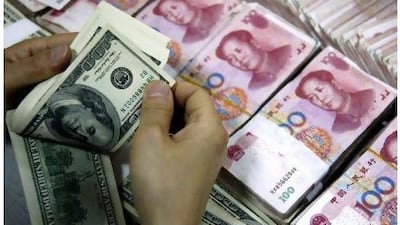The Chinese policy of investing in US securities is risky. But allowing the yuan to float freely will enable the government to keep inflation under control, writes Yu Yongding
ADespite shaky economic fundamentals, US government securities are usually regarded as safe investments. Whenever a crisis erupts, the value of US treasury bonds is boosted. Indeed, US treasuries were among the few assets that did not decline during the global financial crisis in 2009.
But the haven status of US government securities is an illusion. They are safe only in the sense that no one can stop the Federal Reserve from operating its printing presses at full speed.
The market value of treasuries depends on a wide range of factors. Now it is essentially sustained by a Ponzi scheme, with the Fed's policy of quantitative easing keeping the price of treasuries artificially high. But no currency can defy the laws of economic gravity. The market price of treasuries will eventually fall to levels dictated by US economic fundamentals.
For decades, China has been investing its vast savings abroad. The country usually holds US treasuries to maturity and reinvests the principal and proceeds.
What matters is not variations in the book value of these reserves but their real value in terms of purchasing power when China decides to cash in. According to data from the US Treasury, China's holdings of US government securities totalled US$1.16 trillion (Dh4.26tn) at the end of last year, accounting for about 60 per cent of the overall increase in foreign official holdings of US government debt.
China's holdings of US treasuries increased by $351 billion between June 2009 and June last year alone, the largest jump on record. The accuracy of these data is debatable. But they seem to show that, despite sharper rhetoric in Sino-US relations, China has continued lending to the US to keep its own export machine going and to avoid booking large foreign-exchange losses.
It may be too late to do anything about China's existing stock of US treasuries without causing a serious political and financial backlash. But China should at least stop increasing its holdings.
Given the trade and current account surpluses, the People's Bank of China (PBOC) must intervene in currency markets, buying the dollar and selling yuan, to prevent - or moderate - the appreciation of the country's exchange rate. But such interventions inevitably translate into more holdings of US government securities.
To stop this accumulation of foreign exchange reserves, and so minimise China's welfare and capital losses, the simplest solution would be for the PBOC to call a halt to intervention. But this implies that China must allow the yuan to float freely, and thus to appreciate. But nobody knows how much the yuan would appreciate.
The true risk lies in the possibility that the yuan is significantly undervalued, and that appreciation would have a major impact on China's trade balance. In that case, China would have to accept an export slowdown and an increase in unemployment to avoid huge capital losses on its dollar reserves.
At present, the government is trying to slow the GDP growth rate, and job shortages are emerging in coastal areas. With the fiscal position still strong, the government should be able to help enterprises and workers who suffer undue pain from the yuan's appreciation.
Moreover, while exchange rate policy is not an instrument for dealing with China's domestic inflation, yuan appreciation would certainly help the government meet its goal of keeping the annual rate below 4 per cent this year.
Indeed, the increase in foreign exchange reserves has been the single most important monetary source of inflation. But ending central-bank intervention in currency markets is a complex issue.
The devil is in the details. But under any circumstances, the economic and welfare costs of China's slow pace in adjusting the yuan's exchange rate are too high and will increase by the day. It is time for China seriously to consider allowing the yuan to float freely, while reserving the right to intervene when it must, and tighten the management of cross-border capital flows.
Yu Yongding, the president of the Chinese Society of World Economics, is a former member of the monetary policy committee of the People's Bank of China and a former director of the Institute of World Economics and Politics at the Chinese Academy of Social Sciences.
* Project Syndicate

